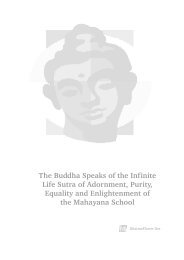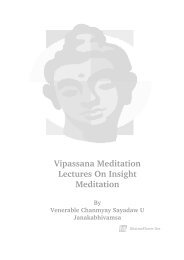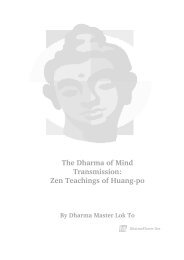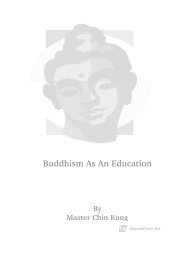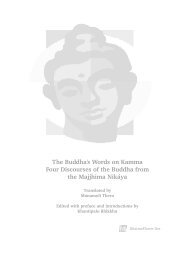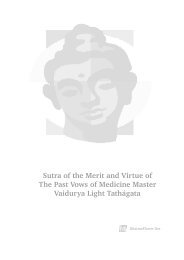THE FOUR NOBLE TRUTHS By Ajahn Sumedho - DharmaFlower.Net
THE FOUR NOBLE TRUTHS By Ajahn Sumedho - DharmaFlower.Net
THE FOUR NOBLE TRUTHS By Ajahn Sumedho - DharmaFlower.Net
Create successful ePaper yourself
Turn your PDF publications into a flip-book with our unique Google optimized e-Paper software.
living rose to its peak at this time, and it burned itself out and ceasedthrough meditation. It was a process of purification.To allow this process of cessation to work, we must be willing tosuffer. This is why I stress the importance of patience. We have toopen our minds to suffering because it is in embracing suffering thatsuffering ceases. When we find that we are suffering, physically ormentally, then we go to the actual suffering that is present. We opencompletely to it, welcome it, concentrate on it, allowing it to be what itis. That means we must be patient and bear with the unpleasantnessof a particular condition. We have to endure boredom, despair, doubtand fear in order to understand that they cease rather than runningaway from them.As long as we do not allow things to cease, we just create new kammathat just reinforces our habits. When something arises, we grasp itand proliferate around it; and this complicates everything. Then thesethings will be repeated and repeated throughout our lives - we cannotgo around following our desires and fears and expect to realise peace.We contemplate fear and desire so that these do not delude us anymore; we have to know what is deluding us before we can let it go.Desire and fear are to be known as impermanent, unsatisfactory andnot-self. They are seen and penetrated so that suffering can burn itselfaway.It is very important here to differentiate between cessation andannihilation - the desire that comes into the mind to get rid ofsomething. Cessation is the natural ending of any condition that hasarisen. So it is not desire! It is not something that we create in themind but it is the end of that which began, the death of that which isborn. Therefore, cessation is not a self - it does not come about from asense of ‘I have to get rid of things,’ but when we allow that which hasarisen to cease. To do that, one has to abandon craving - let it go. Itdoes not mean rejecting or throwing away but abandoning meansletting go of it.Then, when it has ceased, you experience nirodha - cessation,emptiness, non-attachment. Nirodha is another word for Nibbana.When you have let something go and allowed it to cease, then what isleft is peace.You can experience that peace through your own meditation. Whenyou’ve let desire end in your own mind, that which is left over is verypeaceful. That is true peacefulness, the Deathless. When you reallyknow that as it is, you realise nirodha sacca, the Truth of Cessation,in which there’s no self but there’s still alertness and clarity. The realmeaning of bliss is that peaceful, transcendent consciousness.If we do not allow cessation, then we tend to operate fromassumptions we make about ourselves without even knowing what we



